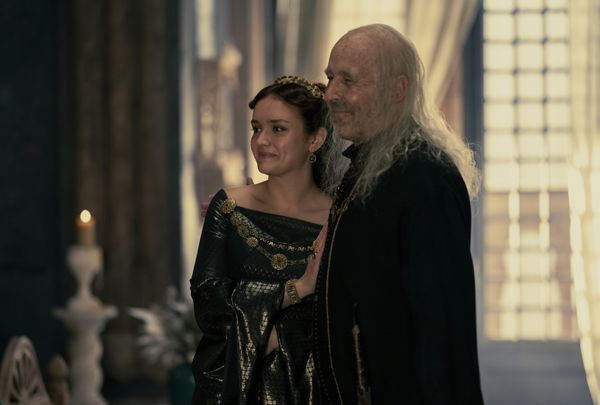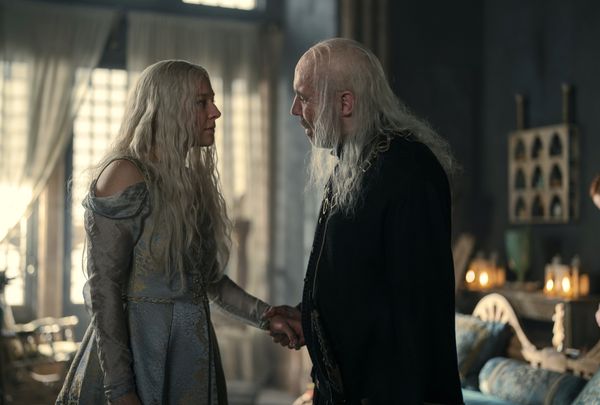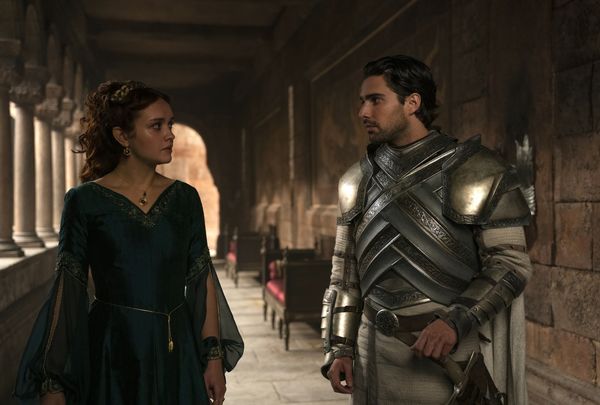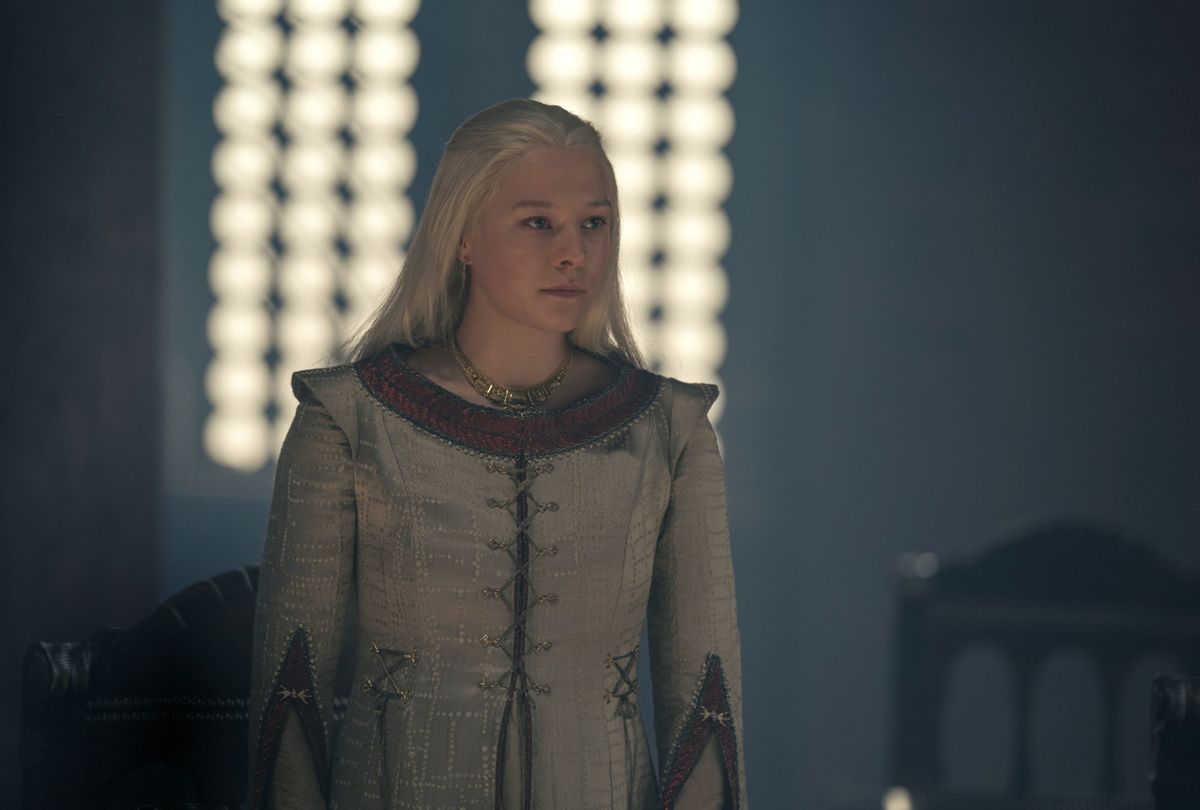Ten years after "House of the Dragon" established where George R.R. Martin's tradition of terrible wedding feasts likely began, Rhaenyra and Alicent have matured into their roles as adult royals – except where it comes to the latter's ability to forgive youthful transgressions. The sixth episode demonstrates this when Alicent (now played by Olivia Cooke) demands an audience with Rhaenyra (Emma D'Arcy) moments after she's given birth to her youngest son. Rhaenyra remains the named heir to the Iron Throne, but Alicent is the queen, giving her the higher hand in this card game.
Alicent also has experienced the enormous pain and distress of childbirth, which means she knows precisely what she's asking of Rhaenyra, who can neither refuse her queen's command nor show frailty while walking the long distance between her bed chamber and that of Alicent and Rhaenyra's father King Viserys (Paddy Considine).
Rhaenyra stands, painfully passing the afterbirth moments after their handmaids tie her into her gown, and leans heavily on her husband, Ser Laenor Velayron (John Macmillan), as she limps her way to the queen and king, clenching her teeth even harder than she holds her newborn. When she finally gets to her destination, the queen pretends to be shocked to see Rhaenyra out of bed so soon after her labors, but both women know what's going on here.
Alicent wants to confirm a suspicion she has about Rhaenyra's children, which she does by sneaking a peek at the dark down covering the baby's head and noticing its similar coloring to that of Ser Harwin Strong (Ryan Corr), heir to Harrenhal. Rhaenyra knows this is also Alicent's version of imposing a Walk of Atonement on her rival, only no absolution is guaranteed upon completion.
The trail of blood on the floor behind her as she leaves the royal chambers leaves no mistake as to what Alicent's move signals. In the coming conflict, Rhaenyra should expect no mercy, because Alicent knows none will be given.
But it also punches home what is shaping up to be one of the core lessons of this series, along with a major reason for the decline of the Targaryen dynasty: Nobody knows how to hurt you like an ex-best friend.
"Game of Thrones" left in its wake many sins that "House of the Dragon" is attempting to ameliorate, not the least of which is the way its women were written and presented onscreen. That likely has a lot to do with the fact that in the entirety of its run, only two women received writing credits on episodes, with one woman eking out a director's credit.
The absence of women behind the scenes in "Game of Thrones" showed in ways that were both extreme – as in, the ways women's bodies were objectified through so-called "sexposition" and lurid onscreen portrayals of rape – and simply disappointing, like Brienne's weeping over Jaime and Daenerys' fastforward from problematic savior into Lady Hitler.
"The Princess and the Queen" is an early example of the ways that "House of the Dragon" is trying to learn from and improve upon the sins of its predecessor by the simple fact that it calls on a woman, Sara Hess, to tell a painfully difficult story about female friends who become enemies.
 Olivia Cooke as Alicent Hightower and Paddy Considine as Viserys Targaryen in "House of the Dragon" (Ollie Upton / HBO)
Olivia Cooke as Alicent Hightower and Paddy Considine as Viserys Targaryen in "House of the Dragon" (Ollie Upton / HBO)
Martin wrote Alicent and Rhaenyra as rivals from the start; on the page, they are a decade apart in age. In the show, they're both teenagers as well as fast friends by the time Rhaenyra's mother Aemma dies in childbirth, and Viserys names Rhaenyra his heir. They share a common emotional history, in that both women lost their mothers at young ages and are the only daughters of demanding, duty-obsessed fathers.
Pitting women against each other is a common lazy trope in TV, even ones made for female audiences. Not surprisingly, over years you'll find that sin is most frequently indulged in by male writers. But Hess, along with Charmaine DeGraté, who wrote the prior episode "We Light the Way," takes care to steer around that cliché's common traps by spelling out the ways these women have been played against each other by their fathers, and the demands of a patriarchal system.
In a way, this pays homage to Martin's usage of shifting points of view throughout "A Song of Ice and Fire," which prevents the reader from drawing easy conclusions as to the heroism or villainy of its principal characters.
"Fire & Blood," the basis for "House of the Dragon," establishes from its opening pages that much of what's to follow comes from a variety of sources, some of them unreliable. The drama's writers extensively take advantage of this narrative malleability when it comes to two of Rhaenyra's most significant relationships, the queasy sexual attraction she has with her uncle Daemon (Matt Smith) and the dissolution of the sisterly bond she once shared with Alicent.
"House of the Dragon" establishes in its opening moments that this season is being told from Rhaenyra's viewpoint through a brief voiceover narration by D'Arcy. It's difficult to discern any emotion in her voice on the first viewing of that scene, but considering what comes after, and especially the events of the sixth episode, perhaps what we're hearing is bitterness and regret.
Over what? There are many ways to answer that, starting with Rhaenyra's choice to abruptly freeze out Alicent after Viserys announced he would marry her.
 Emma D'Arcy as Rhaenyra Targaryen and Paddy Considine as Viserys Targaryen in "House of the Dragon" (Ollie Upton/HBO)
Emma D'Arcy as Rhaenyra Targaryen and Paddy Considine as Viserys Targaryen in "House of the Dragon" (Ollie Upton/HBO)
Before that, Rhaenyra and Alicent act like sisters – sharing confidences, spending every spare moment together, and behaving toward one another with such closeness that some fans speculate they might have been in love. In their youth, Rhaenyra is the typical "dangerous" best friend to Alicent's dutiful daughter. When Alicent's father Otto Hightower (Rhys Ifans) tells her to woo the king, she complies. Rhaenyra, in contrast, refuses her father's commands to marry until he forces her, to salvage her reputation and his own.
But women's relationships are typically depicted with a level of intimacy not shared or displayed by most men. That explains why, for example, Rhaenyra is seen resting her head in Alicent's lap when they're young.
Friends that close don't take it well when one keeps a secret from another, which is what Otto, as the Hand of the King, orders his daughter to do when she begins to secretly spend time with Viserys while he's in mourning. But, as my colleague Alison Stine points out, she's also genuinely compassionate, which ends up unraveling her relationship with Rhaenyra.
Want a daily wrap-up of all the news and commentary Salon has to offer? Subscribe to our morning newsletter, Crash Course.
When rumors about Rhaenyra visiting a pleasure house with Daemon begin circulating, and Otto brings whispers about Rhaenyra's compromised honor to Viserys, Alicent asks her former friend for the truth, believing Rhaenyra wouldn't lie to her. But she does, leading to Alicent taking her side against her father – which gets him fired, disgracing his house.
And Alicent learns the truth in the worst way possible, finding out that Rhaenyra has seduced Ser Criston Cole (Fabien Frankel), a knight so bound to his honor that the thought of it being publicly besmirched leads him to beat a man to death. (Which, by the way, feeds into a separate trope: Bury Your Gays.) Instead of punishing Ser Criston with a gelding or death, she takes him to her side, acknowledging they have a common enemy in the form of an old love who betrayed them.
Hess writes "The Princess and the Queen" as a stretch of petty paybacks from Alicent's side of the castle, beginning with Rhaenyra's bloody march of duty and leading to Ser Criston goading Ser Harwin into an emotional confrontation during a royal training exercise between Alicent and Viserys' silver-haired children, and Rhaenyra's dark-haired sons.
It is strongly insinuated that Ser Harwin fathered the princess' boys, which aligns with what we know about how dominant genes work and the fact that Laenor is not interested in her or any other woman. One may also surmise that Ser Criston sees Ser Harwin, leader of the City Watch, as the off-brand version of himself.
 Olivia Cooke as Alicent Hightower and Fabien Frankel as Ser Criston Cole in "House of the Dragon" (Ollie Upton / HBO)
Olivia Cooke as Alicent Hightower and Fabien Frankel as Ser Criston Cole in "House of the Dragon" (Ollie Upton / HBO)
Spurned love is a real humdinger, and one can imagine the fury a man with existing rage issues must have felt by seeing his Kirkland version sire a bunch of rugrats with the woman he once would have died for. Never mind that Rhaenyra had to turn him down to fulfill her father's plan for her and, not only that, marry and give birth to male heirs "for the realm," even though she never wanted that life.
Thinking of those children, however, is not enough to move the queen and the princess to put aside their ancient quarrel. Before her father and the council, Rhaenyra acknowledges the strife between their families and apologizes for her role in that, suggesting Alicent recall that they used to be BFFs. This wins her nothing. So Rhaenyra turns to strategy, suggesting that along with a betrothal between her eldest son and Alicent's daughter to squash any potential succession beef, Alicent's dragonless child would receive his choice of the next clutch of her dragon's eggs.
In response, and before a room full of men, Alicent calls attention to the fact that Rhaenyra's breast milk is staining her dress.
Sometimes 10 years is enough time for angry wounds to mend and enmities to soften – sometimes. Generally, human sentiment veers the other way, as we carry and nourish old slights against each other across the years and, here's the important part, for no good reason.
Heading into the second half of the first season, "House of the Dragon" is beginning to firm up the motivations of an array of players in this series' coming war for the throne. The book describes the factions as the Greens – Alicent's side – versus the Blacks, referring to Rhaenyra's bewilderingly (but not really) midnight-maned children. Their clash is not the only one that is staged in this episode. Indeed, the villain who emerged takes advantage of the conflict between Alicent and Rhaenyra to his benefit.
But this is one example of what will surely be many that will stretch back to the simple fact that most of these deaths could have been avoided ... if two young women at the center of a world run by men remembered that all they had was each other, and trusted in that truth.
"House of the Dragon" airs Sundays at 9 p.m. on HBO.
Read more
about "House of the Dragon"



Shares